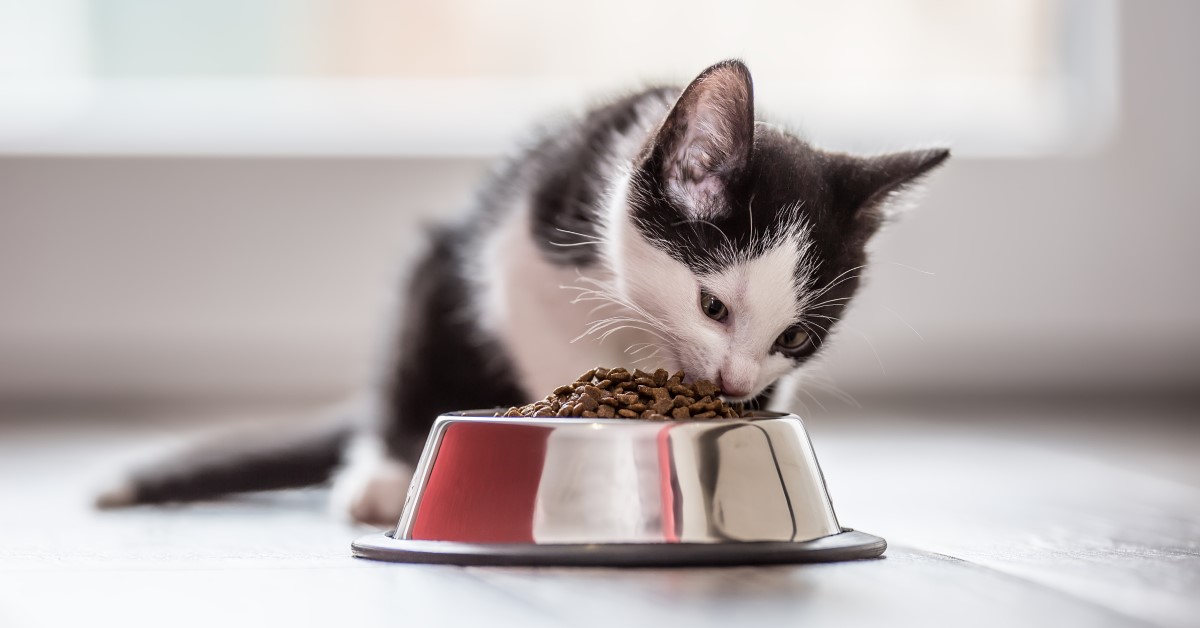The Basics of Cat Diet and Nutrition
Discover more about your cat’s unique dietary needs, from caloric intake to nutrients.

Cats and dogs are both popular pets, and many animal lovers own at least one of each. Unfortunately, it's all too easy and tempting to assume that you can provide both kinds of pets with the same food. But cats aren't small dogs -- they have their own unique set of dietary requirements and challenges. Let's examine the fascinating details of the feline diet, from necessary nutrients and calories to diets for specific health conditions.
Nutrients Your Cat Must Get From Food
While your dog might get its essential nutrients from any combination of meat, fruits, vegetables and other food sources, your cat doesn't enjoy the same nutritional flexibility and convenience. Cats are true carnivores, meaning that only meat can provide them all the nutrients they need to stay well.
A cat's diet must include high levels of protein, which meat does a nice job of providing. Animal tissue also contains vitamin A, niacin, calcium, and fatty acids that a cat's body can't manufacture on its own. Your kitty also relies on meat or meat-based foods to provide 11 essential amino acids that it can't create internally. These amino acids include valine, tryptophan, threonine, taurine, phenylalanine, methionine, lysine, leucine, isoleucine, histidine, and arginine. Along with protein, a feline diet should also include water, fiber, and carbohydrates.
Wet Cat Food Versus Dry Cat Food
Some cats prefer wet food over dry food, while others will munch on dry food without complaint. Assuming that your cat doesn't care one way or the other (highly unusual, we know), which type of food should you serve it?
Both wet cat food and dry cat food have their respective pros and cons. For instance:
Wet food has a generous water content, making it highly useful for keeping your cat properly hydrated. It also offers plenty of protein and amino acids. However, it doesn't keep for very long, and it doesn't offer much in the way of fiber or carbohydrates.
Dry food will remain good longer than wet food, and it provides fiber and carbohydrate content that wet food can't. However, it can prove challenging for cats with sore gums or missing teeth. Cats that free-feed on dry food may also indulge at all hours of the day, raising their risk for obesity.
Ultimately, you may want to hedge your bets by feeding your cat both types of food at different mealtimes. That way, the strengths of one type of food will offset any weaknesses of the other.
How Much Food Does Your Cat Need?
While you don't want to overfeed your cat, you don't want to underfeed it either. The secret lies in giving your cat the right amount of food for its particular stage of life. A cat's caloric requirements change dramatically in accordance with its age and activity level.
A growing kitten can easily burn 280 calories a day. You'll want to feed your little friend several meals a day during this formative period. Ask your veterinarian to recommend a high-quality kitten food fine-tuned to meeting a kitten's nutritional needs.
Older kittens and adult cats can get by just fine on about 200 calories and two meals a day. However, since different cats have different metabolic rates, you should get your veterinarian's opinion on how many daily calories your pet should receive.
Special Diets for Special Kitties
As noted above, too much food can cause your cat to pack on unwanted pounds. However, you may not know whether you have an overweight cat or not. The only sure way to tell is by scheduling periodic wellness exams. Your veterinarian can weigh your cat, compare its frame and age to the number on the scale, and then advise you on dietary and/or lifestyle changes to help your cat slim down. You may also receive recommendations for low-calorie cat food formulas.
A pregnant cat with a limited stomach capacity may need a temporary shift from the standard two meals a day to multiple small meals. You can safely feed your pregnant cat kitten food during this period to ensure that the developing kittens get a full complement of nutrients.
Cats can suffer from a wide range of chronic ailments such as diabetes, kidney failure, liver disease, bowel conditions, and urinary system disorders. If your cat is diagnosed with any of these issues, your veterinarian may prescribe a special diet designed to support that particular condition. This is another great reason to keep up those scheduled wellness visits.
Like humans and many other creatures, cats can develop allergies to specific foods. In most cases, the allergen lies in the food's protein source. If your cat displays an allergy to chicken, for instance, you might try switching to a fish-based product. Your veterinarian can even put your cat on a special hypoallergenic diet if necessary.
Learn More From Your Cat's Veterinarian
Just as cats differ from dogs in their dietary needs, each cat may have its own specific nutritional and dietary struggles to overcome. Keep up your cat's regular schedule of wellness exams, using these appointments to discuss proper dietary and nutritional practices with your veterinarian. With the right mix of knowledge and diligence, you can make a huge contribution to your kitty's health with every meal you serve.
Ready to start saving money on pet wellness care?
Then take a look at Mint Wellness, the pet wellness plan that provides fast reimbursement on routine pet care. Save on vaccinations, wellness exams, preventatives, dental, and more!
Learn More

